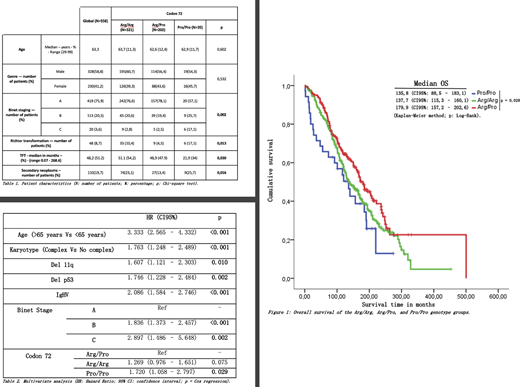Chronic Lymphocytic Lymphoma (CLL) is a heterogeneous disease in which many important factors for its prognosis have been identified. The normal functioning of p53 is one of the most critical barriers against cancer; therefore, if it has a deletion and/or mutation, it is a robust biomarker for the therapeutic response in CLL. The possibility was raised that some germline single - nucleotide polymorphisms of TP53 in healthy populations may also affect p53 function. One of the most studied polymorphisms of the TP53 gene is codon 72 in exon 4, a CGC to CCC transition (R72P), due to its potential effect on cancer risk. As with many types of cancer, its association with a worse prognosis in CLL is unclear. We analyzed the relationship of the genotypes of the TP53 codon 72 polymorphism in a large cohort of patients with CLL, to demonstrate the association of codon 72 with the evolution of the disease.
Using the IDIPHIM patient database, 558 patients with a diagnosis of CLL were included, with clinical data, immunophenotype studies, FISH, IgHV, and karyotype, at the time of diagnosis and during follow-up. The TP53 codon 72 Arg/Arg, Arg/Pro, and Pro/Pro genotypes were analyzed using RT-PCR and Sanger sequencing techniques.
After analyzing the sample of patients, 321 patients with the Arg/Arg genotype, 202 with the Arg/Pro genotype, and 35 with the Pro/Pro genotype were found. In the comparative analysis of the three groups, the patients with the Pro/Pro genotype had a higher number of patients in advanced stages B and C. The latter had a significant association with Binet staging (p = 0.002) compared to the other groups. Likewise, patients with the Pro/Pro genotype had a higher incidence of Richter transformation, whose association was significant (p = 0.013). Also, the patients who were within the Pro/Pro genotype group showed a significant association (p = 0.030) with the Time to the first treatment (TFT), also observing that the group of patients with the Arg/Pro genotype had a more considerable time until your first treatment. 19.7% (110/558) had a second neoplasm, having a significantly higher association with the homozygous groups (Arg/Arg and Pro/Pro) than with the Arg/Pro group, which on the contrary, had fewer second neoplasms (p = 0.016) (see Table 1). Regarding the type of tumors, we found 14.5% of the bladder, 14.5% of the skin, 14.5% of the colon, 13.6% of the prostate, and 12.7% of the lung. No associations were found between Codon 72 and CD38+, ZAP70+, complex karyotype, IgHV, NOTCH-1, del 11q, 12+, p53, del 13q, TP53 mutation. Still, when forming a group between the p53 deletion and TP53 mutation, if significant differences were found (p = 0.023), Pro / Pro group had the highest percentage. The overall survival was 156.32 months (139.92 - 172.72), showing that patients with the Arg/Pro genotype live 40 months more significantly than the other groups (p = 0.028) (see Figure 1). Finally, in the multivariate analysis, age, complex karyotype, 11q deletion, p53 deletion, unmutated IgHV, and Pro/Pro genotype at codon 72 were identified as independent variables associated with an increased risk of death (see Table 2).
In conclusion, the Pro/Pro genotype of TP53 Codon 72 has a potential role in the progression and the higher mortality of patients with CLL. Conversely, the Arg / Pro genotype was associated with a lower incidence of second malignancies and higher overall survival.
No relevant conflicts of interest to declare.
Author notes
Asterisk with author names denotes non-ASH members.


This feature is available to Subscribers Only
Sign In or Create an Account Close Modal